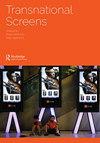阿拉伯女性跨国电影的“翻转”:卖皮肤的男人(本·哈尼亚,2021)
IF 0.4
0 FILM, RADIO, TELEVISION
引用次数: 0
摘要
在这个后殖民时代,考虑到跨越地中海的各种移民,来自马格里布的跨国女性女权主义电影人有时会将其电影叙事的焦点转移到阿尔及利亚,摩洛哥或突尼斯的边界之外。他们没有谴责异性父权制对女性在国内处境的影响,而是将注意力转向全球化及其弊病,并从马格里布以外的现实中拍摄新的故事、美学、政治和不同的主角——包括男性。考瑟·本·哈尼亚(Kaouther Ben Hania)的《卖皮人》(The Man Who Sold His Skin, 2021)就是这样一部电影,讲述了一名叙利亚男子移民到比利时的故事。该分析是对晚期资本主义时代移民、艺术装置、电影和剥削的交叉点的丰富案例研究,探讨了未来跨国电影制作的可能方向,电影观众和放映场所的可能转变,特别是在后covid - 19时代。本·哈尼亚独特的女权主义视角也以一种新颖的拍摄跨国电影的方式在摄影上得到了体现。本文章由计算机程序翻译,如有差异,请以英文原文为准。
Arab women’s transnational cinema’s ‘flips’: The Man Who Sold His Skin (Ben Hania, 2021)
ABSTRACT Given the various migrations across the Mediterranean in this postcolonial age, transnational women feminist filmmakers from the Maghreb have sometimes displaced the foci of their filmic narratives outside the borders of Algeria, Morocco, or Tunisia. Rather than denouncing the weight of heteropatriarchy on the condition of women at home, they turn their attention to globalization and its ills and film new stories, aesthetics, politics, and diverse protagonists – including men – from realities outside the Maghreb. One such film is Kaouther Ben Hania’s The Man Who Sold His Skin (2021), about a Syrian man migrating to Belgium. The analysis this fecund case-study at the intersection of migration, art installation, cinema, and exploitation in the age of late capitalism, examines possible directions for future transnational filmmaking, possible shifts in cinema audience(s) and screening venues, especially in a post-Covid 19 era. Ben Hania’s unique feminist perspective also translates cinematographically in a novel way of filming transnationality.
求助全文
通过发布文献求助,成功后即可免费获取论文全文。
去求助
来源期刊

Transnational Screens
Arts and Humanities-Visual Arts and Performing Arts
CiteScore
0.60
自引率
0.00%
发文量
23
 求助内容:
求助内容: 应助结果提醒方式:
应助结果提醒方式:


